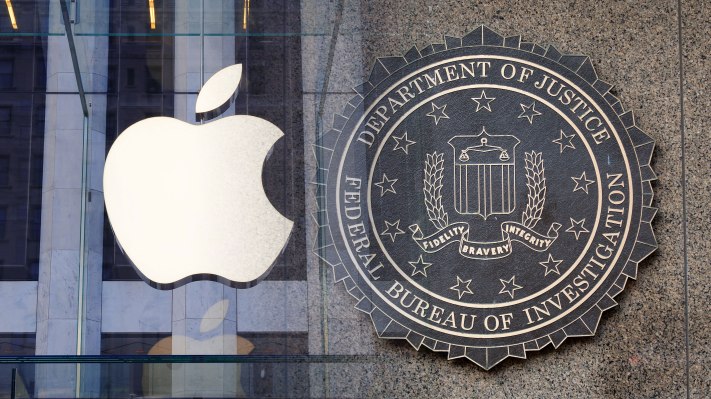Government policy and technology usually coexist in harmony. But occasionally, they get into a brawl. When this happens, policy may win a battle or two, but, ultimately, technology always wins. It simply isn’t a fair fight. Technology moves too fast for policy to keep up.
Take for example the infamous Microsoft versus the Department of Justice antitrust case. As one of the 12 Microsoft executives who was skewered on the witness stand by David Boies, I lived through this nightmare firsthand. The DOJ unambiguously won the legal battle. But policy didn’t win the war. While the DOJ certainly weakened Microsoft, what happened instead is technology, in particular the iPhone, broke the monopoly and now Microsoft is hopelessly behind in mobile computing.
Which brings us to the current war raging between technology and government policy. Apple has used encryption technology to protect user data on the iPhone. But they left a crack in the armor, and the FBI wants to create policy to jump through that tiny crack and read what is on Syed Farook’s phone.
What this tells us is that encryption works. If the FBI or NSA could break strong encryption, then they would remove the memory chips from Farook’s iPhone, copy the data and run it through a cloud of government computers to read the files. But they can’t. Encryption works.
So instead, the FBI has used the All Writs Act law from 1789 to convince a federal judge to force Apple to write a special version of iOS to unlock the iPhone of a bad guy in 2016. If that sounds unlikely, well, it just might work.
Technology moves too fast for policy to keep up.
If this policy wins in court and the FBI forces Apple to break open Farook’s phone, it won’t stop there. Apple will begin living the nightmare of hundreds of state and federal judges demanding exactly the same thing. And that’s just the beginning; governments around the world will join in with their demands. Apple will be forced to unlock phones from Beijing to Moscow, phones of both bad guys and protesters fighting repressive regimes.
When policy wins a round against technology, it often runs amok.
Fortunately, this won’t be the last round. Apple has already signaled its intent to plug the crack they left in today’s iPhone. So very soon, perhaps even later this year, Apple will ship a phone with encryption that even they can’t break. Then no government on earth will be able to open those phones.
Maybe the battle will continue. But for policy to win the next round, it will need to order Apple and the other technology providers using encryption to change their products so the government can look inside. This is the so-called backdoor, and this is dangerous ground for policy makers.
Creating this backdoor requires changes to law — and that means Congress. In a world obsessed with what Snowden revealed and with a public angry enough to possibly elect Donald Trump, do you think Congress will write a new law to create a backdoor for the government to snoop wherever it wants? No chance. Technology will win, hands down.
So does that mean the game is over? That all Apple has to do is move forward and create their iPhone fortress? Well, maybe not. Because technology continues to march forward.
Technical advancements become available to anyone with the will and means to acquire them.
It turns out that technology will almost certainly break today’s approach to encrypting data that is sent over the Internet. A completely different technology called quantum computing is emerging from the lab, with early products being built now. Quantum computing is completely different from today’s digital computers. Instead of calculations using 1s and 0s, quantum computers use something called a qubit, which can represent many values at the same time.
What this means is that some problems that are virtually impossible to solve using today’s digital computers are child’s play for the quantum computer of tomorrow. Of particular interest is the asymmetric encryption approach that is used to secure HTTPS and, thus, just about everything confidential that is sent over the Internet. These keys are practically unbreakable using digital computers. But for a powerful quantum computer, they will be a piece of cake.
We are still a long way from a quantum computer that can pick the lock on encryption keys. Quantum computing today is roughly as advanced as digital computing was in 1971 when Intel created the first microprocessor. But technology moves faster in 2016 than it did in the 1970s.
In 20 years, or maybe even as few as 10, quantum computers may exist that can look inside all of today’s digital communications. Like most new technology, quantum computing will be expensive and complex at first, so it won’t be available to everyone. But the NSA and FBI won’t be deterred, and they will be first in line to buy a quantum computer. This is a pretty scary scenario, but technology does not play favorites. Technical advancements become available to anyone with the will and means to acquire them.
Like all technology, eventually quantum computing will get cheaper and simpler. We’ll all probably carry a quantum computer in our pocket someday. And while quantum computing may someday break today’s encryption keys, something called quantum cryptography promises an approach to encryption that cannot be foiled by a quantum computer. So the pendulum will swing back and the FBI will be frustrated yet again.
The battle never ends. But in the end, technology always wins.

